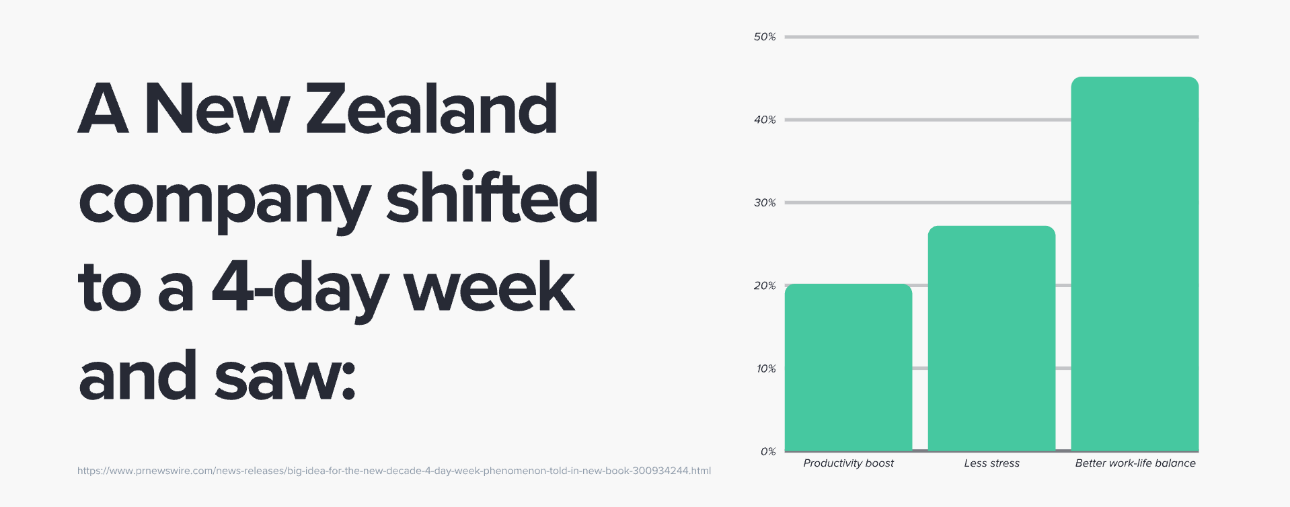Introduction
As the COVID-19 pandemic has completely restructured how employers approached employees’ scheduling and means of work, more discussions have emerged on how productivity can be boosted. A dramatic shift in the working culture has encouraged organizations around the world to discover methods of increasing employees’ work-life balance and effectiveness. This is where the idea of a four-day workweek comes in – it allows to cut the time that employees have to spend working, thus encouraging them to use every hour they have to their advantage. Therefore, there should be a four-day workweek because of its positive impact on employees’ work-life balance and increased productivity.
Main body
The increased discussions of the four-day workweek have spurred interest among scholars worldwide because of the evidence of it leading to increased productivity, happiness, and work-life balance. For example, organizations in Singapore have been focusing their attention on work-life balance for almost two decades (Sng et al., 2021). In 2021, during a parliament meeting, the members of the Workers’ Party introduced the idea of a four-day workweek in the country, referring to statistics and experience from Microsoft Japan, where productivity had risen by 40%, and employee satisfaction had increased to reach 94% (Sng et al., 2021). Besides, it was determined that the decreased workweek could improve the work-life balance among the population and go as far as to increase the birth rate in Singapore.
In addition to Singapore, employers in Iceland have also begun introducing the four-day workweek in light of the pandemic to offer their employees more flexibility. It was determined that workers’ well-being increased significantly across different indicators, including such variables as perceived stress and burnout to overall health (Miranda, 2021). At the same time, productivity did not suffer and remained on the same level in the majority of surveyed organizations. Importantly, participants of the study worked in various settings ranging from hospitals to social service offices. Another study on the same topic was carried out among organizations by Henley Business School that found that companies adopting the solution made 78% of their employees happier, and 70% less stressed, while 62% of them took fewer days off (Rigby, 2021). In a New Zealand company, a shift to a four-way workweek allowed a 20% productivity boost, around 28% less stress, and around 45% better work-life balance (see Figure 1 below).

As organizations enter the post-pandemic world that has transformed due to the working hour shifts due to the pandemic, the reasons why companies should consider a four-day workweek keep expanding. In addition to improving the work-life balance, the solution can help reduce overhead and other costs, with businesses immediately eliminating a percentage of variable overhead expenses, such as energy consumption (Castrillon, 2021). In the above-mentioned Microsoft Japan trial, the transfer to a four-day week caused a fall in electricity bills by 23% (Castrillon, 2021). Besides, workers have used fewer office supplies, which is a good thing in terms of sustainability. Considering other daily perks that some businesses provide to their employees, cutting out just one day can add up to significant savings.
To some potential employees, a four-day workweek may seem appealing, which is why it may help attract and retain talented personnel. This could be a solution to the increased employee turnover, which costs the US economy $30.5 billion every year (Castrillon, 2021). Because many talented workers, especially from the Millennial generation, rate their work-life balance high on their list when considering employment options, the four-day workweek will appear appealing. The findings of the study by the University of Reading (2019) support this theory as the researchers found that two-thirds of employers agreed that a four-day workweek had been instrumental in helping them attract talented workers.
It is crucial to consider the opposite perspective of the issue. Those opposing the idea tend to say that the reduction of working hours per week is an absurd suggestion (Grosse, 2018). The five-day workweek is understandable to both employers and employees, and it has become some sort of a given that should not be questioned. Besides, the five-day workweek may also have longstanding cultural inertia that cannot be changed. The majority of companies cannot tell their personnel not to come to work on Fridays because they fear losing a competitive advantage in the environment of the five-day workweek (Sopher, 2014). Therefore, there may be no point in changing something that has worked for centuries.
Conclusion
To conclude, the five-day workweek is outdated and overrated considering the fact that the modern organizational environments have been shifting to embrace more flexibility and freedom. The four-day workweek will allow employees to plan their work better, thus having an improved work-life balance, which, in turn, will make them more productive. Even though the idea is not without flaws and may not fit all organizations due to their specific differences, the building of a flexible business future entails testing such solutions as the four-day workweek.
References
Castrillon, C. (2021). Why companies should consider a four-day workweek.Forbes. Web.
Grosse, R. E. (2018). The four-day work week. Routledge.
Miranda, G. (2021). Employees in Iceland starting working 4 days a week. It didn’t hurt productivity, researchers say.USA Today. Web.
Rigby, A. (2021). Can the four-day work week save us? (A look at the statistics). Web.
Sng, M., Khor, W. J., Oide, T., Suchar, S. C., & Tan, B. C. K. (2021). Effectiveness of a four-days/eight-hour work week. Embry-Riddle Aeronautical University. Web.
Sopher, P. (2014). Where the five-day workweek came from.The Atlantic. Web.
University of Reading. (2019). Four-day week pays off for UK business. Web.